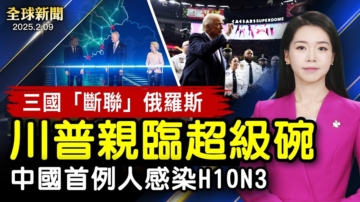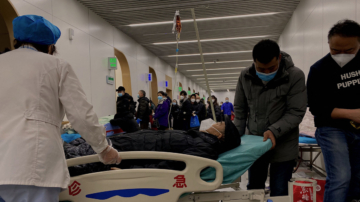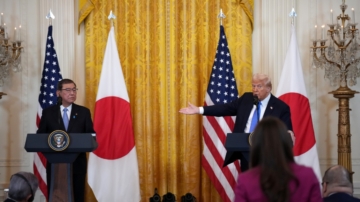【新唐人2014年05月12日訊】目前,中共和菲律賓的緊張局勢還沒有結束,但在南海的另一側,中共與越南又發生了新的衝突。最近,中共船隻在南海的「爭議海域」,向越南巡邏船發射水炮,並多次撞擊越南船隻,導致越方有船員受傷。中共在南海與鄰國不斷發生摩擦,他們是真想打仗嗎?請看以下報導。
中共海事局5月5號宣佈,在未來的三個月將在西沙群島某處,建立一座油井鑽井平臺。但鑽井平臺位置距越南海岸僅120公裡,在越南宣稱的「越南專屬經濟區」內。5月7號,中、越船隻在爭議海域發生了衝突。
越南外交部9號對外公布了兩國船隻衝撞的錄影,並聲稱中國船隻撞擊越南船隻、向越南船隻發射水炮,有兩艘越南船隻嚴重受損,9人受傷。
越南外交部還表示,中共的此次行動,是對越南領海主權和專屬經濟區利益的嚴重挑釁。
美國《華爾街日報》引述越南官員的話說,大約80艘中國船隻進入了西沙群島附近的爭議水域,其中中有7艘是軍用艦艇。
美國中文雜誌《中國事務》總編輯伍凡表示,中國經濟現在正在下滑,中共不僅需要南海的貿易通路進出口物品,而且南海區域也儲藏著巨大的石油,所以,「控制南海」是中共的現實需要。
美國中文雜誌《中國事務》總編輯伍凡:「這次歐巴馬4月份訪問亞洲,他力挺日本和菲律賓,但是他跟越南沒有軍事同盟。所以,中共這次挑戰,首先挑戰越南,看你美國你要打算怎麼做?」
伍凡指出,南海的緊張局勢就是中共有意挑起來的,「緊張局勢」正是中共所需要的。
伍凡:「他第一要轉移國內的矛盾。非常明顯,習近平從反腐打到現在不成功,那麼他要強軍強國來支撐他的地位,以及支撐他的政權。否則,你的政權在國內的經濟搞不好,打腐敗也不能贏,外國欺負你的時候你也沒有任何作為,那你的政權很快就完蛋了。」
伍凡認為,與俄國越走越近的中共,也可能會效仿俄國在烏克蘭的做法,所以與越南發生擦槍走火是有可能的。
而日本外相岸田文雄認為,中、越在南海對峙,是「中國單方面發起的挑釁性海洋活動的一環」,「中國應向越南及國際社會明確說明自身活動的依據」。
美國國務院也指出,中國決定將鑽井平臺建在有爭議的水域,這「具有挑釁性,引起了緊張」。
不過,「香港城市大學」政治學教授鄭宇碩認為,中國與鄰國爭端的升級,實際上也為歐巴馬「重返亞洲」的戰略,創造了有利條件。
香港城市大學政治學教授鄭宇碩:「日本跟中國有釣魚島爭端,菲律賓、越南,甚至比較傾向西方的新加坡、印尼,這些國家,他們都有意利用美國的軍事力量來平行(衡)中國的軍事擴張。」
不過,鄭宇碩認為,從中、美經濟的相互依賴的程度,以及美國人不願意大打仗的民意來看,中、美兩個大國直接出現軍事衝突的可能性非常低。
5月9號的香港《東方日報》社論指出,「南海風高浪急,烽煙四起,菲律賓和越南近日遙相呼應,聯手挑釁中國,北京如果繼續停留在口頭抗議而不敢亮劍,勢必被當作紙老虎,淪為國際笑柄。」
中國國內的一些網站論壇上,對南海不斷升級的領土爭端反應熱烈,主張武力教訓越南、菲律賓的激進言論不絕於耳。
伍凡表示,中共已經在北方丟了那麼多領土,如果在南海再丟掉領土,那就賣國賣到家了。伍凡指出,中國在南海的邊界線是二戰後由「國民黨政府」劃定的,當時沒有任何國家反對。中共目前只不過是想按著當時「國民黨政府」劃定的九段線,劃定領海主權而已。
採訪/易如 編輯/宋風 後製/孫寧
Tensions Increase between the Chinese Communist Party
and Vietnam: Is a War Coming?
With tension between the Chinese Communist Party (CCP)
and the Philippines spiraling, new incidents occurred between
the CCP and Vietnam on the other side of the South China Sea.
Recently, CCP ships have been firing water cannons and
ramming Vietnamese vessels causing them damage.
There were also reports of injuries among Vietnamese crew.
By initiating those incidents, does the CCP seriously want to
start a war? Please look at the following report.
On May 5, the CCP’s Maritime Safety Administration (MSA)
announced it will create an oilrig around the Xisha Islands
in three months.
The planned oilrig is only 120 kilometers off Vietnam’s coast,
and located inside the “Economic Zone” claimed by Vietnam.
On May 7, clashes occurred between Chinese and Vietnamese
vessels in the disputed area.
On May 9, Vietnam’s foreign ministry showed video clips of
the clash and claimed that Chinese ships initiated the collision
against Vietnamese vessels and also fired water cannons.
Vietnam reported that two of its ships were seriously
damaged and nine people were injured.
Vietnam said, the CCP’s move had seriously violated
Vietnam's sovereignty over its exclusive economic zone.
A Wall Street Journal report quoted Vietnamese officials that
about 80 Chinese ships entered the disputed area around the
Xisha Islands, including seven military vessels.
Wu Fan, Editor-in-Chief of China Affairs magazine, commented
that as China is facing economic slowdown, the CCP not only
needs to export its products across the South China Sea, but
also covets the huge amount of oil stored in the region.
So the CCP has a real motivation in controlling the area.
Wu Fan: ”In his visit to Asia in April, president Obama voiced
strong support to Japan and the Philippines.
However, there is no alliance between the U.S. and Vietnam.
So the CCP challenged Vietnam to see how U.S. would react.”
Wu Fan said, the CCP is intentionally raising tension in the
South China Sea; “tension” is exactly what it needs right now.
Wu Fan:”First of all the party attempts to distract Chinese
from domestic problems.
It is easy to see that Xi’s anti-corruption campaign has not
been very successful.
So he acts strongly in military and foreign affairs to
sustain his power.
Otherwise, with failures in economic development and anti-
corruption campaign, if he makes no further achievements in
foreign affairs the whole regime will collapse very soon.”
Wu Fan believes that as the CCP is going more closely to
Russia, it might copy Russia’s moves of grabbing the Crimea;
So it is not impossible that the CCP will have
military conflicts with Vietnam.
Fumio Kishida, Japanese Foreign Minister, said the clashes in
South China Sea waters were results of “CCP provocation”.
Beijing should “clarify to Vietnam and the international
community the basis of its increasing maritime activities.”
The U.S. State Department also said that the CCP’s decision
of locating the rig in disputed waters “is provocative and
will further raise regional tensions”.
Yu-shek Cheng, a politics professor at City University of Hong
Kong, said the CCP’s escalating tension with its neighbors is
also a good chance for Obama’s strategy of “Return to Asia”.
Yu-shek Cheng:”Japan has disputes with the CCP on Senkaku
Islands issues.
The Philippines, Vietnam, including Singapore and Indonesia
that are closer to the western world, are all willing to see if
U.S. military forces can balance CCP aggression in the region.”
Yu-shek Cheng also said, as China and U.S. greatly depend
on each other economically, and most American people
oppose starting another war, it is not likely that these two
powers will make direct military conflicts.
Hong Kong’s Orient Daily published editorial on May 9, saying:
“Tensions and conflicts are increasing in South China waters;
Philippines and Vietnam are collaborating in
challenging China’s sovereignty”.
“If Beijing continues to just condemn without using military
force, it will be seen as a paper tiger and end as a global joke.”
In some Chinese online forums, there have been strong
responses to the escalating territorial disputes in the South
China Sea.
Many advocate that the CCP should “give a lesson” to
Vietnam and Philippines with its navy.
Wu Fan said, with so many lands lost in the north, if the CCP
loses more in the south it will become an even worse traitor
to Chinese people.
Wu Fan further said China’s current border on South China
waters follows that regulated by the Republic of China (ROC)
after World War II.
The CCP currently is trying to claim its territory according to the
same “Nine-dotted line” presented by the ROC.
Interview/Yiru Edit/Shongfeng Post-Production/Shenlin
中共海事局5月5號宣佈,在未來的三個月將在西沙群島某處,建立一座油井鑽井平臺。但鑽井平臺位置距越南海岸僅120公裡,在越南宣稱的「越南專屬經濟區」內。5月7號,中、越船隻在爭議海域發生了衝突。
越南外交部9號對外公布了兩國船隻衝撞的錄影,並聲稱中國船隻撞擊越南船隻、向越南船隻發射水炮,有兩艘越南船隻嚴重受損,9人受傷。
越南外交部還表示,中共的此次行動,是對越南領海主權和專屬經濟區利益的嚴重挑釁。
美國《華爾街日報》引述越南官員的話說,大約80艘中國船隻進入了西沙群島附近的爭議水域,其中中有7艘是軍用艦艇。
美國中文雜誌《中國事務》總編輯伍凡表示,中國經濟現在正在下滑,中共不僅需要南海的貿易通路進出口物品,而且南海區域也儲藏著巨大的石油,所以,「控制南海」是中共的現實需要。
美國中文雜誌《中國事務》總編輯伍凡:「這次歐巴馬4月份訪問亞洲,他力挺日本和菲律賓,但是他跟越南沒有軍事同盟。所以,中共這次挑戰,首先挑戰越南,看你美國你要打算怎麼做?」
伍凡指出,南海的緊張局勢就是中共有意挑起來的,「緊張局勢」正是中共所需要的。
伍凡:「他第一要轉移國內的矛盾。非常明顯,習近平從反腐打到現在不成功,那麼他要強軍強國來支撐他的地位,以及支撐他的政權。否則,你的政權在國內的經濟搞不好,打腐敗也不能贏,外國欺負你的時候你也沒有任何作為,那你的政權很快就完蛋了。」
伍凡認為,與俄國越走越近的中共,也可能會效仿俄國在烏克蘭的做法,所以與越南發生擦槍走火是有可能的。
而日本外相岸田文雄認為,中、越在南海對峙,是「中國單方面發起的挑釁性海洋活動的一環」,「中國應向越南及國際社會明確說明自身活動的依據」。
美國國務院也指出,中國決定將鑽井平臺建在有爭議的水域,這「具有挑釁性,引起了緊張」。
不過,「香港城市大學」政治學教授鄭宇碩認為,中國與鄰國爭端的升級,實際上也為歐巴馬「重返亞洲」的戰略,創造了有利條件。
香港城市大學政治學教授鄭宇碩:「日本跟中國有釣魚島爭端,菲律賓、越南,甚至比較傾向西方的新加坡、印尼,這些國家,他們都有意利用美國的軍事力量來平行(衡)中國的軍事擴張。」
不過,鄭宇碩認為,從中、美經濟的相互依賴的程度,以及美國人不願意大打仗的民意來看,中、美兩個大國直接出現軍事衝突的可能性非常低。
5月9號的香港《東方日報》社論指出,「南海風高浪急,烽煙四起,菲律賓和越南近日遙相呼應,聯手挑釁中國,北京如果繼續停留在口頭抗議而不敢亮劍,勢必被當作紙老虎,淪為國際笑柄。」
中國國內的一些網站論壇上,對南海不斷升級的領土爭端反應熱烈,主張武力教訓越南、菲律賓的激進言論不絕於耳。
伍凡表示,中共已經在北方丟了那麼多領土,如果在南海再丟掉領土,那就賣國賣到家了。伍凡指出,中國在南海的邊界線是二戰後由「國民黨政府」劃定的,當時沒有任何國家反對。中共目前只不過是想按著當時「國民黨政府」劃定的九段線,劃定領海主權而已。
採訪/易如 編輯/宋風 後製/孫寧
Tensions Increase between the Chinese Communist Party
and Vietnam: Is a War Coming?
With tension between the Chinese Communist Party (CCP)
and the Philippines spiraling, new incidents occurred between
the CCP and Vietnam on the other side of the South China Sea.
Recently, CCP ships have been firing water cannons and
ramming Vietnamese vessels causing them damage.
There were also reports of injuries among Vietnamese crew.
By initiating those incidents, does the CCP seriously want to
start a war? Please look at the following report.
On May 5, the CCP’s Maritime Safety Administration (MSA)
announced it will create an oilrig around the Xisha Islands
in three months.
The planned oilrig is only 120 kilometers off Vietnam’s coast,
and located inside the “Economic Zone” claimed by Vietnam.
On May 7, clashes occurred between Chinese and Vietnamese
vessels in the disputed area.
On May 9, Vietnam’s foreign ministry showed video clips of
the clash and claimed that Chinese ships initiated the collision
against Vietnamese vessels and also fired water cannons.
Vietnam reported that two of its ships were seriously
damaged and nine people were injured.
Vietnam said, the CCP’s move had seriously violated
Vietnam's sovereignty over its exclusive economic zone.
A Wall Street Journal report quoted Vietnamese officials that
about 80 Chinese ships entered the disputed area around the
Xisha Islands, including seven military vessels.
Wu Fan, Editor-in-Chief of China Affairs magazine, commented
that as China is facing economic slowdown, the CCP not only
needs to export its products across the South China Sea, but
also covets the huge amount of oil stored in the region.
So the CCP has a real motivation in controlling the area.
Wu Fan: ”In his visit to Asia in April, president Obama voiced
strong support to Japan and the Philippines.
However, there is no alliance between the U.S. and Vietnam.
So the CCP challenged Vietnam to see how U.S. would react.”
Wu Fan said, the CCP is intentionally raising tension in the
South China Sea; “tension” is exactly what it needs right now.
Wu Fan:”First of all the party attempts to distract Chinese
from domestic problems.
It is easy to see that Xi’s anti-corruption campaign has not
been very successful.
So he acts strongly in military and foreign affairs to
sustain his power.
Otherwise, with failures in economic development and anti-
corruption campaign, if he makes no further achievements in
foreign affairs the whole regime will collapse very soon.”
Wu Fan believes that as the CCP is going more closely to
Russia, it might copy Russia’s moves of grabbing the Crimea;
So it is not impossible that the CCP will have
military conflicts with Vietnam.
Fumio Kishida, Japanese Foreign Minister, said the clashes in
South China Sea waters were results of “CCP provocation”.
Beijing should “clarify to Vietnam and the international
community the basis of its increasing maritime activities.”
The U.S. State Department also said that the CCP’s decision
of locating the rig in disputed waters “is provocative and
will further raise regional tensions”.
Yu-shek Cheng, a politics professor at City University of Hong
Kong, said the CCP’s escalating tension with its neighbors is
also a good chance for Obama’s strategy of “Return to Asia”.
Yu-shek Cheng:”Japan has disputes with the CCP on Senkaku
Islands issues.
The Philippines, Vietnam, including Singapore and Indonesia
that are closer to the western world, are all willing to see if
U.S. military forces can balance CCP aggression in the region.”
Yu-shek Cheng also said, as China and U.S. greatly depend
on each other economically, and most American people
oppose starting another war, it is not likely that these two
powers will make direct military conflicts.
Hong Kong’s Orient Daily published editorial on May 9, saying:
“Tensions and conflicts are increasing in South China waters;
Philippines and Vietnam are collaborating in
challenging China’s sovereignty”.
“If Beijing continues to just condemn without using military
force, it will be seen as a paper tiger and end as a global joke.”
In some Chinese online forums, there have been strong
responses to the escalating territorial disputes in the South
China Sea.
Many advocate that the CCP should “give a lesson” to
Vietnam and Philippines with its navy.
Wu Fan said, with so many lands lost in the north, if the CCP
loses more in the south it will become an even worse traitor
to Chinese people.
Wu Fan further said China’s current border on South China
waters follows that regulated by the Republic of China (ROC)
after World War II.
The CCP currently is trying to claim its territory according to the
same “Nine-dotted line” presented by the ROC.
Interview/Yiru Edit/Shongfeng Post-Production/Shenlin








